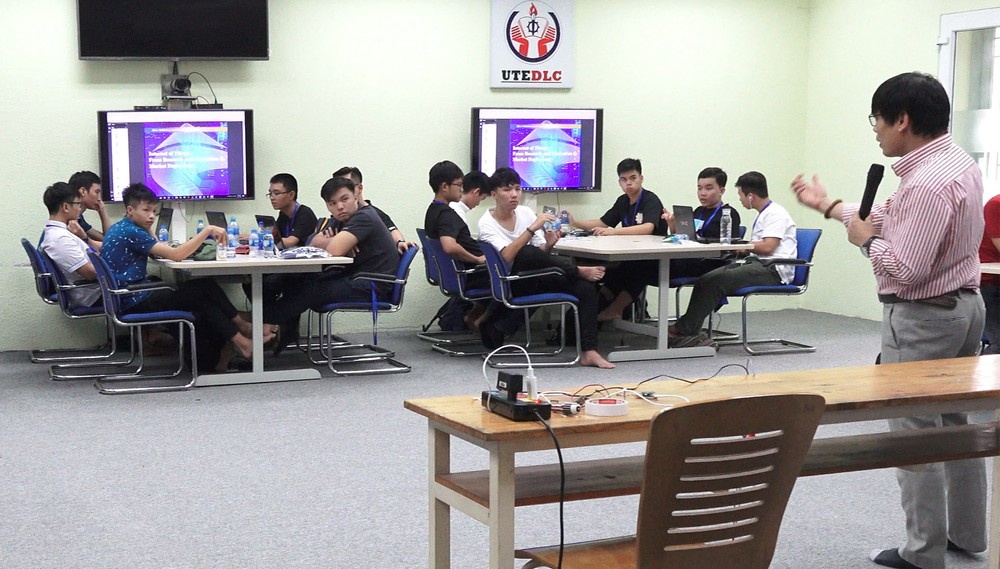
In order to attract financial resources from all economic sectors in society for the development of education and training according to the Resolution 29-NQ /TW, the Government has issued preferential policies such as policies on land allocation, land lease, tax policies, credit to encourage people to join hands for the development of education.
According to the Ministry of Education and Training, the network of private educational establishments has developed steadily throughout localities, especially in big cities, industrial parks, and export processing zones, helping to reduce school pressure on the public school system to meet the rapidly increasing number of students.
So far, around 41,529 preschool and general education establishments are located in the country. Of which, there are 3,928 private educational establishments including 3,209 non-public preschool education establishments and 719 general education establishments with more than 1.2 million students accounting for 5.78 percent of the total number of students nationwide.
In addition, the network of private education and training establishments is growing rapidly and has made many important contributions to the development and improvement of education and training quality.
The country has so far had 67 private higher education institutions and 655 private vocational education institutions including 87 colleges, 220 intermediate schools, and 348 vocational education centers. Privately-invested training institutions have become autonomous in their activities, improving training quality and affirming their brands in training fields; thus, many of them have attracted a large number of students.
The National Assembly and the Government have issued preferential policies and mechanisms to attract domestic and foreign investment in financial development resources for the development of education and training.
Of these, the Mekong Delta Province of Ben Tre has called on Japan’s Niigata City Charity Organization to build 2 classrooms worth VND190 million (US$7,691) while Nguyen Dinh Chieu Secondary School in Hanoi received funding from the Christoffel Blindenmission Organization of the Federal Republic of Germany for an educational program for blind children with a total cost of VND399 million. The US Samaritan Organization donated VND462 million to award scholarships and vocational training to students of Nguyen Van To Continuing Education Center in Hanoi.
Thankfully, students and teachers have the opportunity to access more foreign training programs, with advanced and modern content, methods, foreign documents and learning materials as well as direct exchanges with foreigners to learn more about human culture and knowledge, and at the same time convey Vietnamese culture to people and countries around the world.
Deputy Nguyen Thi Mai Hoa from the National Assembly Delegation of the Northern Province of Hai Duong said that the recent results of the monitoring project on general education have shown a huge lack of both teaching and learning equipment and funding sources to meet the requirements of basic and comprehensive innovation in education.
Regarding facilities, the city is short of 63,920 rooms at all grades between 2014 and 2022 while total funding for the implementation of general education innovation accounts for only 1.46 percent of total state budget expenditure.
Most localities face difficulties in funding investment in education, especially those where the budget cannot be balanced. Despite difficulties, the education sector has attracted VND6,420.22 billion social contributions accounting for 3 percent of the total funding for reforming the general education program with 9 foreign direct investment projects in general education with a total registered capital of US$33.71 million.
This is a very important support resource for developing education and training; therefore, the government should continue to improve policies to encourage and create favorable conditions for domestic and foreign investors to pour more money into the education sector to improve its training quality at all grades.
According to Vice President of the Vietnam Association of Educational Psychological Sciences Nguyen Tung Lam, social financial contributions in the education sector are not only simply supporting the State in the context of a limited investment budget for education, but also helping to improve education. quality of education; thereby, satisfying learners’ growing needs as per the rules of the market economy.
Local administrations should have a policy of allocating clean land to investors who have the conditions to build schools and collect affordable tuition fees at each grade within a certain time will recover investment capital. Localities and investors should calculate to have appropriate tuition fees, which may be higher than public schools but must certainly be acceptable to parents’ students.
Deputy Director of Ho Chi Minh City Department of Education and Training Le Hoai Nam disclosed the southern metropolis is calling for the construction of 86 school projects. In the near future, Ho Chi Minh City will call for businesses to jointly build 86 school projects, according to the public-private partnership method. Each project has an investment capital of over VND100 billion. The city will provide vacant land for building schools and preferential loans within 7 years.
The city People's Committee has directed the Department of Education and Training to advise on school construction projects, including school construction with state capital and with social contributions from investors. In addition, the Ho Chi Minh City People's Council is also about to issue a resolution calling for cooperation in the form of a public-private partnership.
























